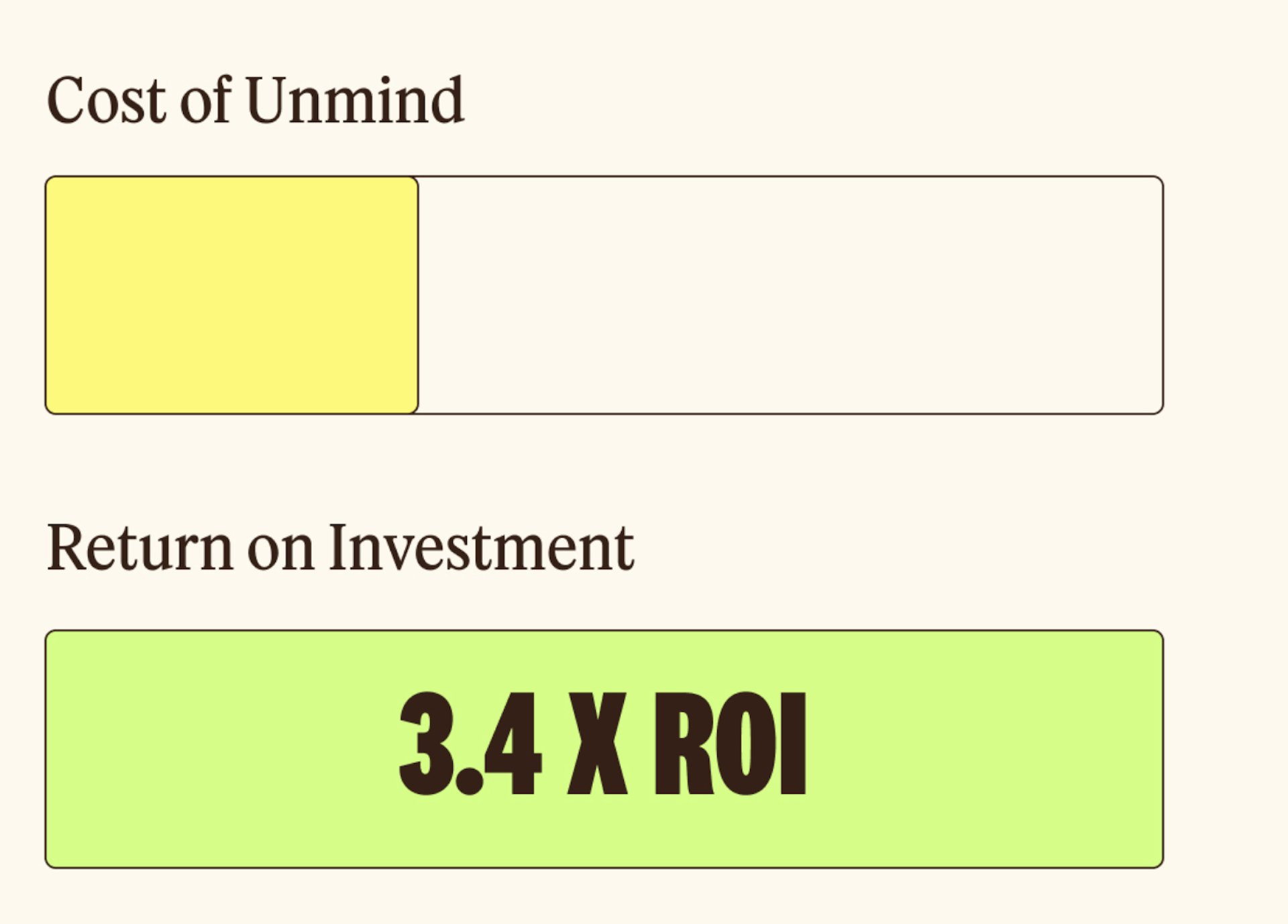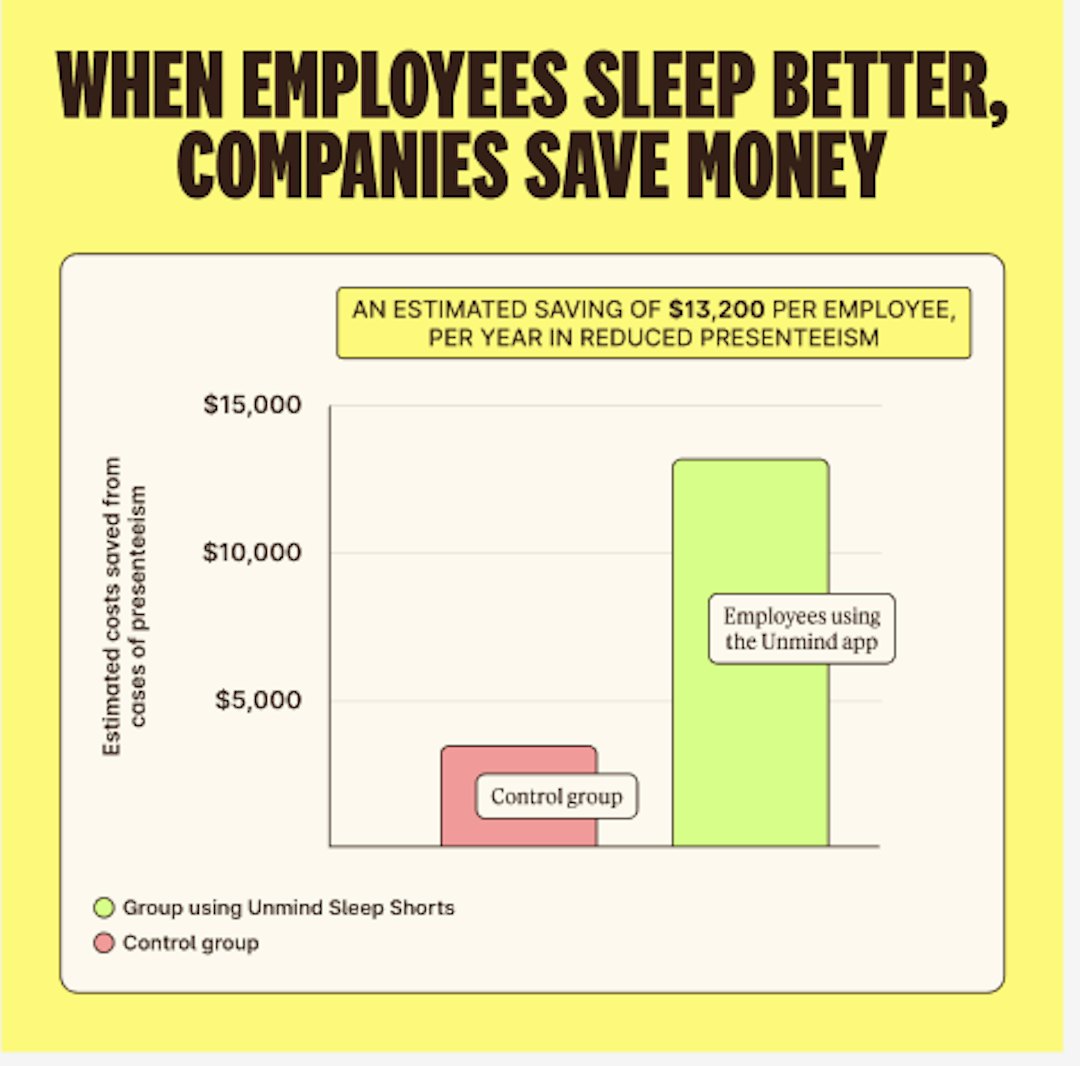NSFW? Part 5: 3.4x ROI – How wellbeing investment pays back

Dr. Jazz Croft
26 April 2024

Content
- Leading with evidence
- Measuring Unmind’s impact
- Understanding wider impact
We began this blog series with a bold question: are wellbeing solutions sustainable for work?
According to a study by Oxford University of over 1,600 US companies and 15 million employee surveys from Indeed.com, wellbeing supports productivity. They found:
- The Top 100 ‘happiest’ companies outperform S&P 500 and Dow Jones by 20% since 2021
- A one-point increase in company happiness (on a 1-5 scale) predicts approximately a $2-3 billion USD increase in annual profit
This means that investing $1,000 in companies with employees who report higher wellbeing in January 2021 would leave an investor with around $1,300 by the start of March 2023, compared with roughly $1,100 had they invested instead in the S&P 500.
The Health and Safety Executive (HSE) champions workplace mental health support as “not just a compassionate choice but also a strategic one” – pointing to data that shows 25% higher productivity, among companies that prioritize mental health.
This matches up with our own ROI calculations and global research. Using scientific estimates and client usage data, our calculations show the average ROI for global enterprises is 3.4x ROI in the past 12 months based on engagement with Unmind’s science-backed tools and content.
From the platform launch and subsequent years of access, we see the platform deliver returns for employers thanks to embedding access to Unmind in their organization.
Here’s your explainer on our ROI calculations and how we’re further developing our methods to quantify the impact of Unmind on financial performance.

Leading with evidence
As a science-backed platform, we do our homework and show our workings. As we continue to grow and innovate with new platform features and services, so do our ROI capabilities. Currently, our estimate is based on a small part of our platform and we’re developing capabilities to capture the wider impact of the platform.
To deliver the most reliable and accurate ROI figures, we model our estimates based on peer-reviewed, scientific trials that measure the impact of Unmind on wellbeing and productivity. As our research grows, we’ll build on these figures with findings on Unmind’s impact from client trials with international organizations.
Measuring Unmind’s impact
Our current model takes impact data from the longest-established platform feature: our content and science-backed tools. As part of our scientific research program, we’ve conducted trials of the impact of our tools and content managing low mood2 and poor sleep3 developed by our in-house psychologists.

A key outcome of these studies to measure the impact of Unmind is improvements to performance thanks to improved mental health. We use the WPAI (Workplace Productivity Activity Impairment) measure which is a widely-used measure in scientific studies, of work impairment specifically due to mental health difficulties. This includes time away from work and time at work where work is negatively affected by mental health difficulties (presenteeism).
Our studies show that using the Unmind platform to support sleep and manage mood has a positive impact on productivity. For our sleep tools, these savings in productivity are estimated as an equivalent of $13,200 USD saving per year, per employee based on trial results4.
To generate ROI estimates, we combine data on client usage and meaningful engagement with our platform, the cost of Unmind to our clients, and the estimated improvement in productivity based on our scientific trials.
Understanding wider impact
Our ROI calculations are currently based on features of our platform that capture a small part of the overall impact of Unmind on performance and wellbeing.
As our research grows, our estimates will increase to reflect the platform's positive impact and increased ROI using insights from client and scientific research data. This will include reliable, transparent estimates of ROI from our range of platform features including access to coaching and therapy, leadership training, and professional services.
As we’ve explored, wellbeing solutions are everywhere. Please beware the ones that promise a lot, then deliver little (and maybe sell your data in the background).
Instead, look for a platform that is evidence-based (don’t forget, that’s just 5% of all mental health providers, so it’s a small pool). Who have their own in-house psychologists. Publish their own research. And, ultimately, deliver sustainable high performance.
Want to learn more, and start building your company’s toolkit for wellbeing transformation? You can start today, for free. Download The Unmind Blueprint.
References
1. Calculations are based on platform usage and estimated impact of Unmind content based on findings from our Randomised Controlled Trials. Costings vary according to each client and are indicative only.
2. Taylor, R., Male, R., Economides, M., Bolton, H., & Cavanagh, K. (2023). Feasibility and preliminary efficacy of digital interventions for depressive symptoms in working adults: a multi-arm randomised pilot trial. JMIR Form Res 2023;7:e41590
3. Economides, M., Male, R., Bolton, H., & Cavanagh, K. (2023). Feasibility and preliminary efficacy of mobile tools to improve sleep health in working adults experiencing poor sleep: a multi-arm randomized pilot trial. Sleep, Volume 46, Issue 7, zsad053, https://doi.org/10.1093/sleep/zsad053
4. Based on yearly savings per employee on a full-time salary of $80,000 USD
About the Author

Dr. Jazz Croft, Senior Scientific Liaison
About the Author
